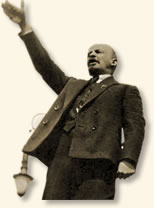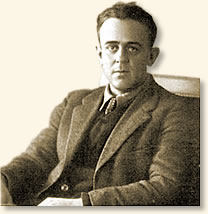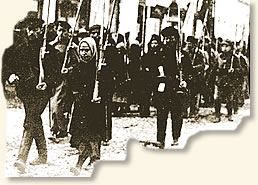|
The Bolsheviks Storm
the Winter Palace, 1917
On the evening of April 3, 1917 a train from Finland
arrived in St. Petersburg, Russia and changed history. Aboard was Vladimir Lenin,
previously exiled to Switzerland by the Czarist government but returned to Russia
by the Germans in the hope that he would transform the popular unrest ignited
by the overthrow of the Czar two months earlier into a revolution that would
topple the Provisional Government and take Russia out of the war. The German
hopes were realized six months later.
 |
Vladimir Lenin rallies a
St. Petersburg crowd, 1917
|
Lenin was determined to lead his Bolsheviks to power by exploiting the war-weariness
that affected Russian citizens and soldiers alike. Throughout the spring and
summer he attempted to rally the crowds in the streets of St. Petersburg through
rabble-rousing speeches that called for Russia’s immediate withdrawal
from the war. However, his efforts to transform the enflamed passions of the
people to a march on the headquarters of the Provisional Government at the
former Czar’s Winter Palace failed.
Continued set-backs on the Eastern Front further eroded the strength of the
Provisional Government. The rift between the Russian Army and the Russian Government
widened with each faction suspecting the motives of the other. Finally, Alexander
Kerensky, the leader of the Provisional Government, called upon the Bolsheviks
to defend the city of St. Petersburg against the possibility of a military
coup. Kerensky even went so far as to supply arms to the Bolsheviks.
The military coup never materialized, but the esteem of the Provisional Government
was diminished while the legitimacy of the Bolsheviks was enhanced - and now
they were armed. Emboldened, Lenin ordered an assault on the Winter Palace
on the night of October 25. Although later Bolshevik propaganda portrayed the
attack as a savage battle, it was relatively bloodless. The defenders of the
Palace – Cossacks,
a women’s battalion and military cadets or yunkers gave up with little
resistance. The immediate outcome was to plunge Russia into a brutal civil
war that ended with a Bolshevik victory in 1921.
John Reed was born to privilege in Oregon. He attended
Harvard and after graduating in 1910, pursued a carrier in journalism. His coverage
of labor strikes in New Jersey and the Mexican Revolution turned his
political leanings to the left. In 1917 he traveled to Russia to cover the turmoil
there. He immediately embraced the Bolshevik cause and was welcomed into the
movement. He joined the assault on the Winter Palace and later wrote of his experience.
We join his story as the insurrectionist mob makes its way down the darkened
streets of St. Petersburg:
"Like a black river, filling all the street, without song or cheer we poured
through the Red Arch, where the man just ahead of me said in a low voice: ‘Look
out, comrades! Don't trust them. They will fire, surely!’ In the open we
began to run, stooping low and bunching together, and jammed up suddenly behind
the pedestal of the Alexander Column.
‘How many of you did they kill?’ I asked. ‘I don't know.
About ten.’
After a few minutes huddling there, some hundreds of men, the army seemed
reassured and without any orders suddenly began again to flow forward. By this
time, in the light that streamed out of all the Winter Palace windows, I could
see that the first two or three hundred men were Red Guards, with only a few
scattered soldiers. Over the barricade of firewood we clambered, and leaping
down inside gave a triumphant shout as we stumbled on a heap of rifles thrown
down the yunkers who had stood there.
On both sides of the main gateway the doors stood wide open, light streamed
out. and from the huge pile came not the slightest sound. carried along by
the eager wave of men we were swept into the right hand entrance, opening into
a great bare vaulted room, the cellar of the East wing, from which issued a
maze of corridors and stair-cases. A number of huge packing cases stood about,
and upon these the Red Guards -and soldiers fell furiously, battering them
open with the butts of their rifles, and pulling out carpets, curtains, linen,
porcelain plates, glassware.
One man went strutting around with a bronze clock perched on his shoulder;
another found a plume of ostrich feathers, which he stuck in his hat. The looting
was just beginning when somebody cried, ‘Comrades! Don't touch anything!
Don't take anything! This is the property of the People!’ Immediately
twenty voices were crying, ‘Stop! Put everything back! Don't take anything!
Property of the People!’ Many hands dragged the spoilers down. Damask
and tapestry were snatched from the arms of those who had them; two men took
away the bronze clock. Roughly and hastily the things were crammed back in
their cases, and self-appointed sentinels stood guard. It was all utterly spontaneous.
Through corridors and up stair-cases the cry could be heard growing fainter
and fainter in the distance, ‘Revolutionary discipline! Property of the
People.’
We crossed back over to the left entrance, in the West wing. There order was
also being established. ‘Clear the Palace!’ bawled a Red Guard,
sticking his head through an inner door. ‘Come, comrades, let's show
that we're not thieves and bandits. Everybody out of the Palace except, the
Commissars, until we get sentries posted.’
 |
| John Reed, 1917 |
Two Red Guards, a soldier and an officer, stood with revolvers in their hands.
Another soldier sat at a table behind them, with pen and paper. Shouts of ‘All
out! All out!’ were heard far and near within, and the Army began to
pour through the door, jostling, expostulating, arguing. As each man appeared
he was seized by the self-appointed committee, who went through his pockets
and looked under his coat. Everything that was plainly not his property was
taken away, the man at the table noted it on his paper, and it was carried
into a little room.
...Yunkers came out, in bunches of three or four. The committee seized upon
them with an excess of zeal, accompanying the search with remarks like, ‘Ah,
Provocators! Kornilovists! Counter-revolutionists! Murderers of the People!’ But
there was no violence done, although the yunkers were terrified. They too had
their pockets full of small plunder. It waa carefully noted down by the scribe,
and piled in the little room. The yunkers were disarmed. ‘Now, will you
take up arms against the People any more?’ demanded clamouring voices.
"No," answered the yunkers, one by one. Whereupon they were allowed
to go free.
...In the meanwhile unrebuked we walked into the Palace. There was still a
great deal of coming and going, of exploring new - found apartments in the
vast edifice, of searching for hidden garrisons of yunkers which did not exist.
We went upstairs and wandered through room after room.
..The old Palace servants in their blue and red and gold uniforms stood nervously
about, from force of habit repeating, ‘You can't go in there, harm! It
is forbidden.’ We penetrated at length to the gold and malachite chamber
with crimson brocade hangings where the Ministers had been in session all that
day and night and where the shveitzari had betrayed them to the Red Guards.
The long table covered with green baize was just as they had left it, under
arrest. Before each empty seat was pen and ink and paper; the papers were scribbled
over with beginnings of plans of action, rough drafts of proclamations and
manifestos. Most of these were scratched out, as their futility became evident,
and the rest of the sheet covered with absent-minded geometrical designs, as
the writers sat despondently listening while Minister after Minister proposed
chimerical schemes. I took one of these scribbled pages, in the h-and writing
of Konovalov, which read, ‘The Provisional Government appeals to all
classes to support the Provisional Government.’
...we didn't notice a change in the attitude of the soldiers and Red Guards
around us. As we strolled from room to room a small group followed us, until
by the time we reached the great picture gallery where we had spent the afternoon
with the yunkers, about a hundred men surged in after us. One giant of a soldier
stood in our path, his face dark with sullen suspicion.
 |
| Bolshevik volunteers , 1917 |
.‘Who are you?’ he growled. ‘What are you doing here?’ The
others massed slowly around, staring and beginning to mutter. ‘Provocatori’I
heard somebody say. ‘'Looters !’ I produced our passes from the
Military Revolutionary Committee. The soldier took them gingerly, turned them
upside down and looked at them without comprehension. Evidently he could not
read. He handed them back and spat on the floor. ‘Bumagi! Papers!’ said
he with contempt. The mass slowly began to close in, like wild cattle around
a cowpuncher on foot. Over their heads I caught sight of an officer, looking
helpless, and shouted to him. He made for us shouldering his way through.
'I'm the Commissar,' he said to me. ‘Who are you? What is
it?’ The others held back, waiting. I produced the papers.
'You are foreigners?' he rapidly asked in French. 'It is
very dangerous.' Then he turned to the mob, holding up our documents. ‘Comrades!’ he
cried. 'These people are foreign comrades from America. They have come
here to be able to tell their countrymen about the bravery and the revolutionary
discipline of the proletarian army!'
'How do you know that?' replied the big soldier.'‘I tell
you they are provocators! They say they came here to observe the revolutionary
discipline of the proletarian army, but they have been wandering freely through
the Palace, and how do we know they haven't got their pockets full of loot?'
'Pravilno!' snarled the others, pressing forward.
'Comrades! Comrades!' appealed the officer, sweat standing out
on his forehead. ‘I am Commissar of the Military Revolutionary Committee.
Do you trust me? Well, I tell you that these passes are signed with the same
names that are signed to my pass!’
He led us down through the Palace and out through a door opening onto the
Neva quay, before which stood the usual committee going through pockets. ‘You
have narrowly escaped,’ he kept muttering, wiping his face.
References:
This eyewitness account appears in: Reed, John, Ten Days That
Shook the World (1935); Salisbury, Harrison, Black night, white snow: Russia's
Revolutions 1905-1917 (1977).
How To Cite This Article:
"The Bolsheviks Storm the Winter Palace, 1917" EyeWitness to History, www.eyewitnesstohistory.com (2006).
|






